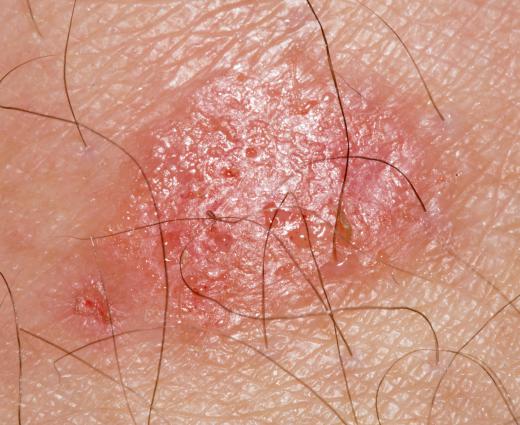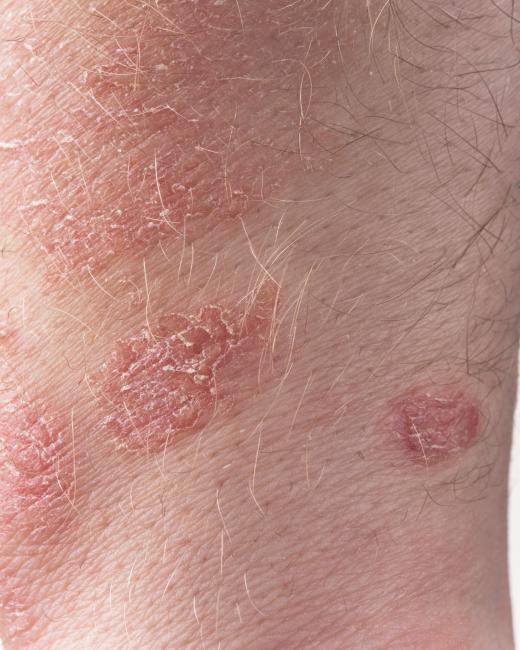What is Zinc Pyrithione?
 Mary McMahon
Mary McMahon
Zinc pyrithione is a chemical complex which has been used since the 1930s. It has a number of applications, of which the most famous is probably dandruff shampoo. Most products which are designed to fight dandruff contain this complex. Other hair and skin products also contain this complex, as do certain prescription medications, and it also has some industrial uses, most notably in paints.
This chemical complex has antibacterial and antifungal activities, along with resistance to ultraviolet radiation. It can be used in topical applications to treat fungal or bacterial infections of the skin and hair, ranging from tinea pedis to dandruff. Some conditions for which zinc pyrithione are commonly prescribed include: impetigo, dermatitis, ringworm, dry skin, eczema, and staphylococcus infection of the skin. It is also sometimes recommended to patients with psoriasis, although the effectiveness of zinc products in the treatment of psoriasis has been questioned.

Many over the counter products contain zinc pyrithione in varying concentrations. It can be found listed in the active ingredients, and the ingredients list should also include a disclosure of how much of the complex is present in the product. If home treatment for skin and scalp irritation with products which contain this substance is ineffective, it may be necessary to see a doctor to have the condition evaluated, and to access stronger prescription products which may contain more zinc pyrithione, or other products which may be more suitable to the specific condition being treated.

This product is designed for external use only, and it should not be ingested or applied to wounds which are oozing, or in which the skin is clearly broken. It may be dangerous for pregnant women and breastfeeding mothers, along with people who have zinc allergies. Most over the counter products have concentrations low enough that it should not cause harm, but in patients with extra sensitivity, allergic reactions to the zinc pyrithione or to other compounds in the product can occur, in which case it is important to take the container to the doctor when seeking treatment for the allergies.

In paints, zinc pyrithione is used to help the paints resist mildew and mold, allowing them to last longer. The complex can also prevent paints from fading by resisting UV radiation, keeping paints brighter longer. Not all paints can be blended with this substance, as the complex can interfere with some of the ingredients which allow certain paints to dry, and the complex is most commonly used in paints intended for outdoor use, because they need to be more weather resistant. Zinc pyrithione is also added to things like sponges to help these products resist colonization by bacteria and fungi.
AS FEATURED ON:
AS FEATURED ON:
















Discussion Comments
This article does not answer it's own question. What is it?
It explains what is does, partly. It is also a major agricultural fungicide sprayed onto crops for the intended purpose.
So then, you are technically are ingesting it. Still, what are its origin components comprised of?
Has anyone here used zinc pyrithione for hair loss? I've heard that shampoos containing zinc pyrithione (some anti-dandruff shampoos) can reduce hair shedding. I don't have dandruff and I've never used this type of shampoo before. But I have been experiencing more shedding than usual lately and I'm looking for an over the counter solution. This seems like an affordable and easy option but I'm worried about possible side effects.
Do zinc pyrithione shampoos have side effects?
@donasmrs-- They're different compounds. They are both used in various topical products, but for different purposes.
Zinc oxide is mainly used as baby rash cream. It can soothe mild skin irritations. It's also used in sunblock to provide protection from sun's rays.
Zinc pyrithione can be used for more severe skin conditions like various types of dermatitis. It's especially effective for conditions that cause skin flaking or scales like seborrheic dermatitis and psoriasis.
I guess the one thing that zinc oxide and zinc pyrithione have in common is that they may not work for everyone. It's possible to be allergic to these as well.
What is the difference between zinc oxide and zinc pyrithione? I think they're both used in skin products.
Post your comments